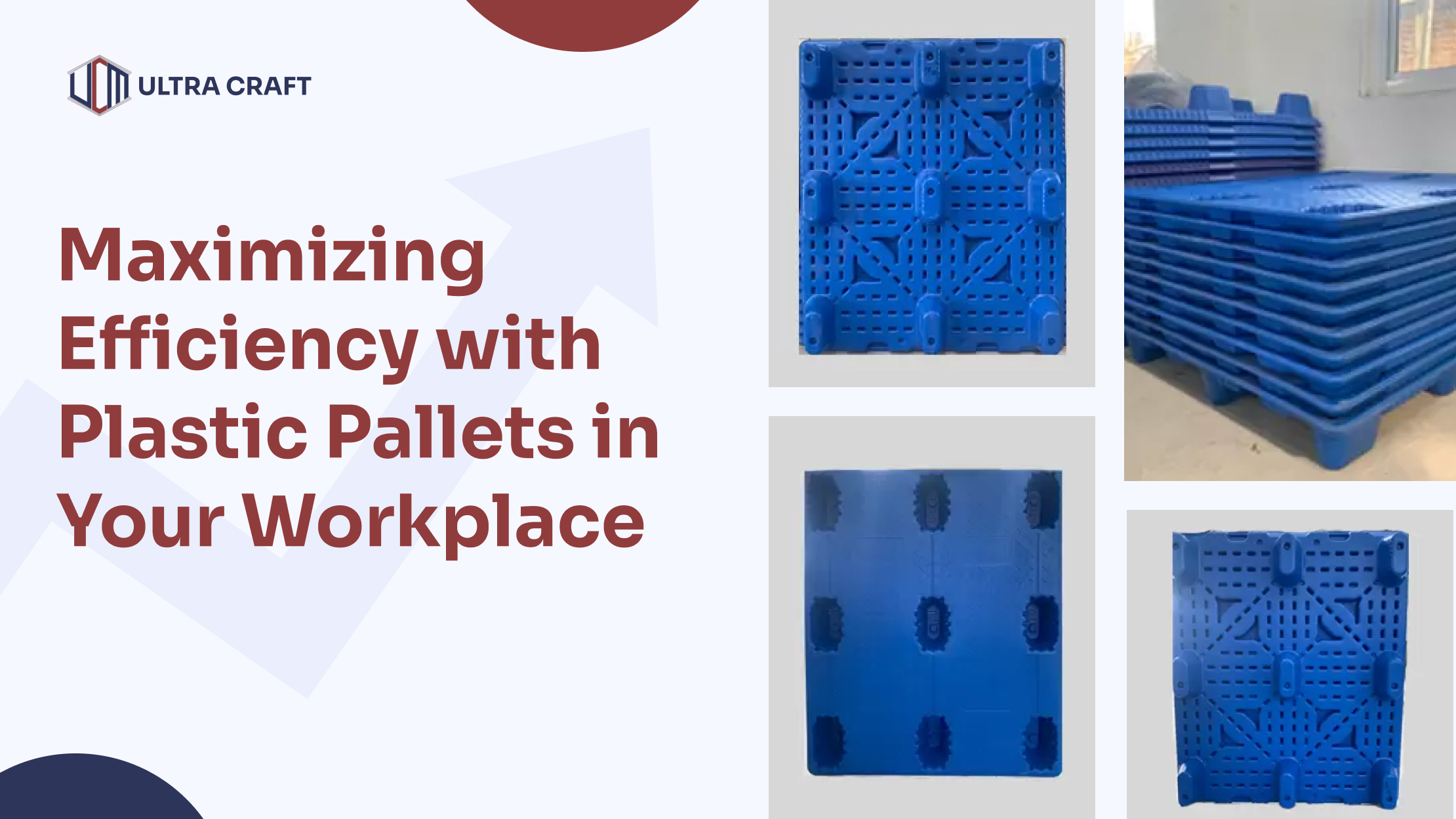Maximizing Efficiency with Plastic Pallets in Your Workplace
Understanding Plastic Pallets
To prevent damage to the quality of a large number of items during transport, plastic pallets function as solid frameworks that give mechanical stability. The term “handling” refers to any operation involving the manipulation of goods, such as picking up, moving, stacking, storing, or transporting them over great distances by land or sea. To make it easier to transport items, plastic pallets are made to be moved by forklifts, pallet jacks, and front loaders. Typically, pallets can be built from materials such as metal, polymers, wood, and paper. Pallets made of plastic are preferable to those made of wood or metal since they are easier to transport, save on expenses, and keep clean. There are various plastic pallet designs a firm may choose from depending on their demands. Plastic pallets are ubiquitous in logistics and supply chain operations, whether at a warehouse, factory, retail outlet, or logistics provider. Yet, all forms of pallets remain a crucial instrument in the logistics and supply chain business.
Plastic pallet sizes are standardized to meet the requirements of regulatory bodies in a given area. In order to speed up shipping and reduce mishaps, standard pallet sizes were developed. Also included in this category of rules are restrictions pertaining to pallets made of non-wood materials.
Are Plastic Pallets Better Than Wooden Pallets?
Pallets are an integral part of the manufacturing and logistics processes, and their significance is not lost on those who work in these fields. Because they play such a significant role in the distribution process, it’s important to give some thought to the sort of pallet that will serve your company’s needs in the years to come. Wood and plastic are the two most common materials used to construct pallets. There are benefits and drawbacks to both wood and plastic pallets, but in the long run, recycled plastic pallets provide the best value for money. The primary benefits of plastic pallets over wooden pallets are discussed, as well as why many forward-thinking companies have made the switch.
Weighing the Benefits of Plastic Pallets vs. Wooden Pallets
Wooden pallets have been indispensable in logistics for quite some time now. The vast majority of pallets (90-95%) are still constructed from wood. Because of their low cost and the ease with which they may be repaired or recycled, they are frequently used. In contrast, wooden pallets are cumbersome and expensive to maintain. The collection of trash is a major challenge in the recycling industry, much more so than sorting and processing the trash for recycling. Wooden pallets increase the risk of pest infestation and cross-contamination when they are wet, and their uneven surface can make cleaning them a hassle. The food and pharmaceutical industries are especially vulnerable to this problem.
To What End Are Plastic Pallets Used?
The advantages of plastic pallets listed here will help you see why you should switch to them today.
To begin with, plastic pallets are more convenient to move.
Plastic is more long-lasting than wood and won’t rot after multiple flights. Polypropylene pallets are durable, lightweight, and easy to stack and transport using a forklift, making them perfect for transporting and warehousing heavy goods. In addition, plastic pallets are more resilient in extreme conditions than wood pallets, making them ideal for shipping.
Plastic pallets are affordable
Due to its lesser weight compared to wooden pallets, plastic pallets typically result in cheaper shipping costs through land, sea, and air. Plastic pallets may be more expensive up front, but their long lifespan typically results in far cheaper trip costs. Technology advancements in recent years have further reduced the price of plastic pallets compared to wooden ones.
Hygienic conditions can be maintained with plastic pallets
Mold, insects, fumigation, and the absorption of odors are no longer difficulties with plastic pallets because they do not absorb moisture like wood pallets do. Plastic pallets have a flat surface, making them ideal for post-use sanitation. The pharmaceutical and food and beverage industries, both of which have stringent cleanliness and safety standards, benefit greatly from the use of plastic pallets.
Polypropylene pallets are far more secure and less dangerous
Plastic pallets, in contrast to wooden ones, do not have any weak places. The reason is, they are made of a single piece of plastic, making them unbreakable. As a result, there is less possibility of failure under stress. Nails, splinters, and broken boards can all be avoided when plastic pallets are used instead of wooden ones. As a result, both your precious inventory and your personnel will be protected from harm.
Less storage area is needed for plastic pallets
Plastic pallets can be nested easily, which is a major benefit over wooden pallets. One common design element of nestable pallets is a nine-leg base that allows them to nest neatly inside one another.
Pallets made of plastic are more adaptable
Plastic pallets come in several shapes and sizes, making them flexible for usage in a wide variety of settings. Plastic pallets are more adaptable and durable than wood ones, so they can be customized to meet the needs of any business, whether they focus primarily on the warehouse or the export market.
A plastic pallet will endure longer than a wooden one
While deciding between plastic and wood pallets, it’s important to think about how they’ll be used. You should choose high-quality, long-lasting pallets if you plan to use them frequently for transportation or storage. Plastic pallets can be reused numerous times before showing significant signs of wear and tear. This helps fight the wasteful consumer culture that leads to global warming, and it positions your company favorably in the annals of history by removing trash from the environment rather than adding to it.
Using recycled plastic is the most eco-friendly choice
Weighing the advantages of plastic over wood pallets, it’s always a good idea to investigate all of your available options. With the proliferation of plastic pallets, many may wonder if they are the most eco-friendly choice. This problem has been resolved. Using plastic pallets has many advantages, and now you can get those benefits without feeling guilty about introducing more plastic to the environment because these pallets are produced entirely from recycled plastic.
In light of the Sustainable Development Goals, many contemporary multinational corporations are shifting away from wood pallets and converting to plastic pallet manufacturers in an effort to green their supply chains.
If you need to ship a lot of heavy items, opting for a plastic pallet instead of a wooden one will help keep trees from being cut down. The fact that pallets can be recycled like wood is not enough when four football fields worth of forest are being lost around the world every minute. Indeed, companies that use wood pallets that can’t be replenished are adding to the degradation of our planet. A circular plastic economy, in which trash is reduced rather than produced, is supported in part by pallets manufactured from recycled plastic.
Just How Do Plastic Pallet Manufacturers Create Plastic Pallets?
In what way do we construct our plastic pallets from recycled materials?
ThermoFusionTM is the cutting-edge manufacturing technology used to create them. This process transforms mixed plastic trash into something completely new and useful: a durable product with a long lifespan. Less energy is used than is necessary during production as compared to the creation of plastic pallets made from a virgin plastic source.
- The expense of grading and sorting plastic garbage from the general population is added to the profit made from salvaging it.
- The technology used in ThermoFusionTM transforms the garbage into a workable dough.
- Pallets are made by a compression molding process that provides an eco-friendly and environmentally responsible alternative to littering our environment with plastic garbage.
Wooden Pallets vs. Plastic Pallets: What Should I Use?
Plastic pallets have a number of advantages over their wooden counterparts, but whether or not they should be used is determined by the load they will be carrying. It makes sense to pick the most lightweight and inexpensive option if the pallet will be utilized for one-way international shipping. If, on the other hand, you plan to utilize the pallet more than once, either at different locations or in your own warehouse, investing in a more robust option will save you money in the long run.
Establish a benchmark for the industry
It is possible to reach your zero waste targets, whether you run a forward-thinking business or are a logistics manager searching for ways to optimize the supply chain. You can move your business forward competitively into the future and offset your carbon impact without sacrificing either the quality of your products or your profits.

